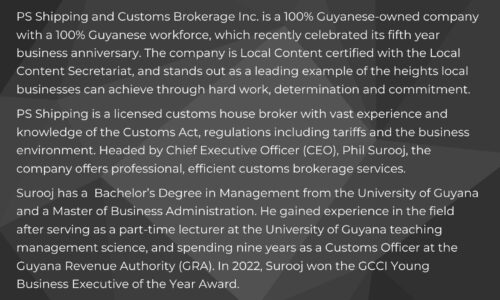Republic Bank official talks CFATF ‘name-and-shame’ implications on banking sector
(www.guyanachronicle.com) MANAGING DIRECTOR of Republic Bank (Guyana) Limited (RBL), Mr. John Alves, has noted that what continues to persist over the past nine months in the Banking sector is a slowdown of activities as a result of due diligence measures being applied by the banks consequent to the decision of the Caribbean Financial Action Task Force (CFATF) on Guyana’s non-compliance in implementing effective Anti-Money Laundering and Countering the Financing of Terrorism (AML/CFT) legislation.
Alves made this observation last night during an interview with the Guyana Chronicle at the Georgetown Chamber of Commerce and Industry’s (GCCI) distinguished lecture series at the Pegasus Hotel in Kingston. That
lecture featured Advisor and Vice-President of Corporate Services of the Caribbean Development Bank, Dr. Toussant Boyce, on effective Anti-Money Laundering and Countering the Financing of Terrorism (AML/CFT) regimes.
He contended that other countries have been put on notice to be cautious in dealing with Guyana, and at this point it is difficult to determine how the CFATF advisory will ultimately affect the banking sector, since such an advisory only pertains to the 32 members of the Caribbean Financial Action Task Force.
DUE DILIGENCE
“The banks have been practising enhanced due diligence for quite a while. In fact, the Central Bank had issued a guideline some time last year”, Alves noted.
Questioned about the measures being taken by the banking sector over the past nine months, he said, “Banks have been taking steps to know their customers.”
As for the effectiveness of due diligence measures, Alves observed that all Banks require the services of a correspondent bank, whether in the United States of America, Canada, or the United Kingdom, in order to transact business in US dollars or any other currency. As such, it is important that the local banks have apt due diligence systems in place, which allows for easy access to integral information.
However, such systems are not error-proof and would still accrue some challenges.
Alves also said that persons who are now seeking to open accounts with the banks must provide specific forms of identification as well as proof of address. Such measures aid any bank’s efficiency in verifying the identity of its customers, and understanding the nature and source of transactions being conducted.
Such processes, Alves declared, have been observed by the banks for quite some time. However, he said, “I don’t think it was practised uniformly”.
Measures such as the provision of information on deposits made, levels of withdrawals, and other balances, he continued, are useful in aiding the banks to gauge any transactions which are out of the ordinary.
REFERAL TO FATF
The senior RBL official asserted that the FATF advisory stands within the jurisdiction of the 32 member countries. However, referrals to the International Financial Action Task Force (FATF) would cause North American countries to make unilateral decisions, since an advisory following an ill-fated assessment of Guyana from the FATF would see some countries being advised to decide on whatever steps are most applicable to defend against money laundering and terrorism financing risks emanating from Guyana.
INTERNATIONAL TRANSACTIONS
Alves said that international transactions carry similar due process mechanisms to local transactions in order to determine identity of the sender, standing relation between the sender and the bank, source of the funding, and even when levels of credit have been established, Alves recalled.
“They will want to know the customer’s business in relation to the nature of the business, and how long the customer has been in that business,” he disclosed.
GCCI LECTURE SERIES
Commenting on the effectiveness of the presentation on sensitising the public, Alves stated, “It has clarified quite a number of things”. The presentation, he said, has managed to open up the minds of the attendees to seeing the possibilities that lurk if the current state of affairs is allowed to persist.
Alves deemed it evident that some countries have grappled with circumstances similar to what obtains in Guyana, but he said such countries have managed to resolve same.
“The first step is really to be compliant, but it is the effectiveness of what you do; and that is really where the litmus test is, in the effectiveness of what we do”, Alves declared.
Alves has called for consensus among all parties involved to find consensus in resolving the issue, which remains a critical one with far-reaching implications for Guyana, particularly in terms of investment, since non-compliance with the AML/CFT regime of measures ultimately erodes investor confidence.




